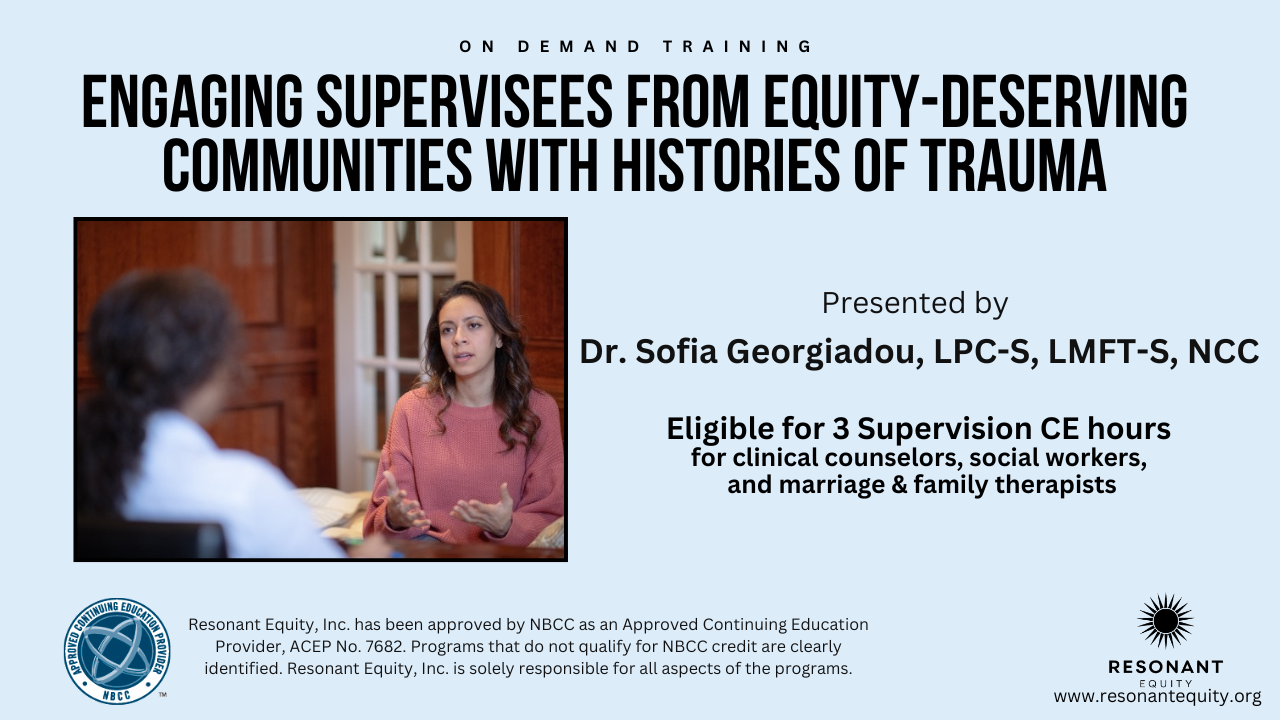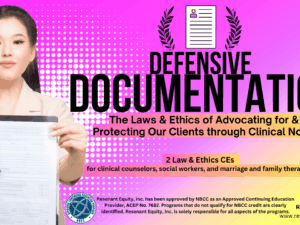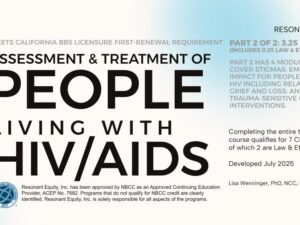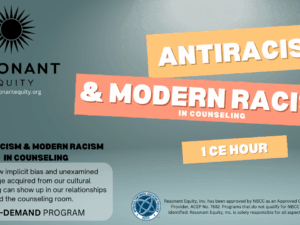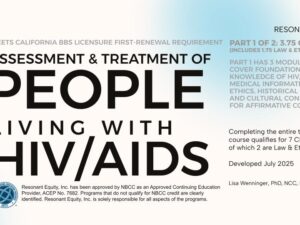- Description
- Curriculum
- Reviews
Video source is missing or invalid.
Engaging Supervisees from Equity-deserving Communities with Histories of Trauma
- Intended for: Novice/Beginning Learners: No advance knowledge required
- Content/curriculum: The entire curriculum is focused on culture and implicit bias topics, The entire curriculum is focused on providing supervision
- NBCC Content Area: Counseling Theory/Practice and the Counseling Relationship, Social and Cultural Foundations, Counselor Professional Identity and Practice Issues
- CE hours available: 3
Program Description
This course addresses the critical gap in trauma-informed and culturally responsive supervision practices within mental health professions. It tackles the widespread challenge of providing effective supervision to clinicians from equity-deserving communities who may have experienced trauma or systemic oppression. In this course, we will confront the often-overlooked impact of trauma and cultural factors on the supervisory relationship, which can hinder our supervisees’ professional development and clinical effectiveness. Through case studies and experiential self-reflection activities, new and experienced supervisors will advance their ability to approach supervision with cultural humility and authentic engagement.
About the term “equity-deserving group”
A definition from the Diversity Glossary Project at the University of New Brunswick:
“Equity-deserving group is a catch-all term that refers to any group that experiences systemic/structural discrimination and marginalization. Although you may see these groups also referred to as “equity-seeking,” the term ‘equity-deserving’ is gradually replacing ‘equity-seeking’ (especially in Canada) to better situate disadvantaged groups as deserving and entitled to equitable treatment rather than as interlopers (someone who is begging or meddling), and places the responsibility of equity on those with power (i.e., the dominant group).”
We propose this term may be preferable compared to similar language such as “under-resourced”, “disadvantaged” and even “historically marginalized”, as “equity-deserving” places the responsibility for equity on those with power (as per the above definition) and is not deficit-forward.
Examples of equity-deserving groups include Indigenous peoples, racialized communities, newcomers, people targeted due to their specific religious affiliation, people with disabilities, women, gender minorities, and members of the 2SLGBTQIA+ community.
- Indigenous Peoples: First Nations, Métis, and Inuit people and communities.
- Racialized Communities: Individuals or groups perceived as non-white and subjected to racism and discrimination.
- Religious Communities: Individuals or groups targeted or oppressed due to their spirituality, faith or religious affiliation.
- Newcomers, Refugees, and Asylum Seekers: Individuals who have recently immigrated or are seeking refuge.
- Persons with Disabilities: Individuals with physical, sensory, mental, or intellectual impairments.
- Women: People who self-identify as women.
- Gender Minorities: Individuals whose gender identity differs from the traditionally defined male or female.
- 2SLGBTQIA+ Community: Individuals with diverse sexual orientations and gender identities.
As captured by this term, this workshop is structured around the responsibility we carry as supervisors.
Learn more at www.antiracistcounseling.org/.
Educational Goals
Participants in this workshop will examine how trauma and systemic oppression impact the supervisory relationship. Participants will reflect on their own cultural biases and areas for growth. Participants will learn to apply practical strategies that go beyond traditional supervision models to incorporate trauma-sensitive approaches and cultural humility into their supervisory practice.
Learning Objectives
Upon completion of this program, participants will be able to:
- Describe strategies to create safety, build trust, and cultivate appropriate vulnerability in both individual and group supervision contexts.
- Identify their own cultural biases and areas for growth.
- Develop a concrete plan for integrating trauma-informed, culturally responsive practices into their supervisory approach.
Equity Focus
Besides defining trauma, we will discuss how systemic oppression shows up in supervisory relationships. We will also define equity-deserving identities in relation to clinical supervision. Participants will be invited to identify their own privileged and marginalized identities. We will discuss how trauma and systemic oppression impact the supervisory relationship with supervisees from equity-deserving communities. This training will also focus on helping attendees evaluate their own cultural biases, assumptions, and areas for growth as supervisors working with culturally diverse supervisees and their clients. We will define microaggressions and micro-interventions to engage in courageous conversations about identity, power, and privilege with supervisees. We will also practice strategies for addressing microaggressions and repairing ruptures in the supervisory alliance. The training will set up participants for success in creating a plan to integrate safety, build trust, and cultivate appropriate vulnerability into one’s supervisory approach to promote equity in supervisory settings.
Presenters
Presenter Name: Dr. Sofia Georgiadou, LPC-S, LMFT-S, NCC (she/her)
Dr. Sofia Georgiadou (she/her) is the owner of Dr. Sofia Consulting PLLC offering LPC and LMFT supervision in Texas, continuing education courses for therapists and supervisors, as well as grant writing for non-profits and for-profit organizations. She is also the President-elect of the Texas Association of Marriage and Family Therapy (TAMFT). Sofia teaches as Affiliate Faculty at Northwestern University and Capella University’s online MFT programs. For the last 3 years, she has served as an Assistant Professor and Internship Coordinator at the University of Houston-Clear Lake’s MFT program. Clinically, she has worked with foster care teens, homeless youth, HIV+ positive adults, and adults with gender expansive identities.
Sofia is originally from Greece. She identifies as a systemic thinker at heart, as well as a trauma-informed and culturally responsive therapist, educator, and supervisor.
 |
Resonant Equity, Inc. has been approved by NBCC as an Approved Continuing Education Provider, ACEP No. 7682. Programs that do not qualify for NBCC credit are clearly identified. Resonant Equity, Inc. is solely responsible for all aspects of the programs. |
-
1Engaging Supervisees from Equity-deserving Communities with Histories of Trauma
-
2Reflection Exercise: Trauma
-
3Engaging Supervisees from Equity-deserving Communities with Histories of Trauma Part 2
-
4Reflection Exercise: Social location
-
5Engaging Supervisees from Equity-deserving Communities with Histories of Trauma Part 3
-
6Reflection Exercise: Microintervention
-
7Engaging Supervisees from Equity-deserving Communities with Histories of Trauma Part 4
-
8Reflection Exercise: Micraaffirmations
-
9Engaging Supervisees from Equity-deserving Communities with Histories of Trauma Part 5
-
10Reflection Exercise: Rupture Repair
-
11Engaging Supervisees from Equity-deserving Communities with Histories of Trauma Part 6
-
12Reflection Exercise: Alicia
-
13Engaging Supervisees from Equity-deserving Communities with Histories of Trauma Part 7
-
14Reading
-
15Post-Test
-
16Course Evaluation
